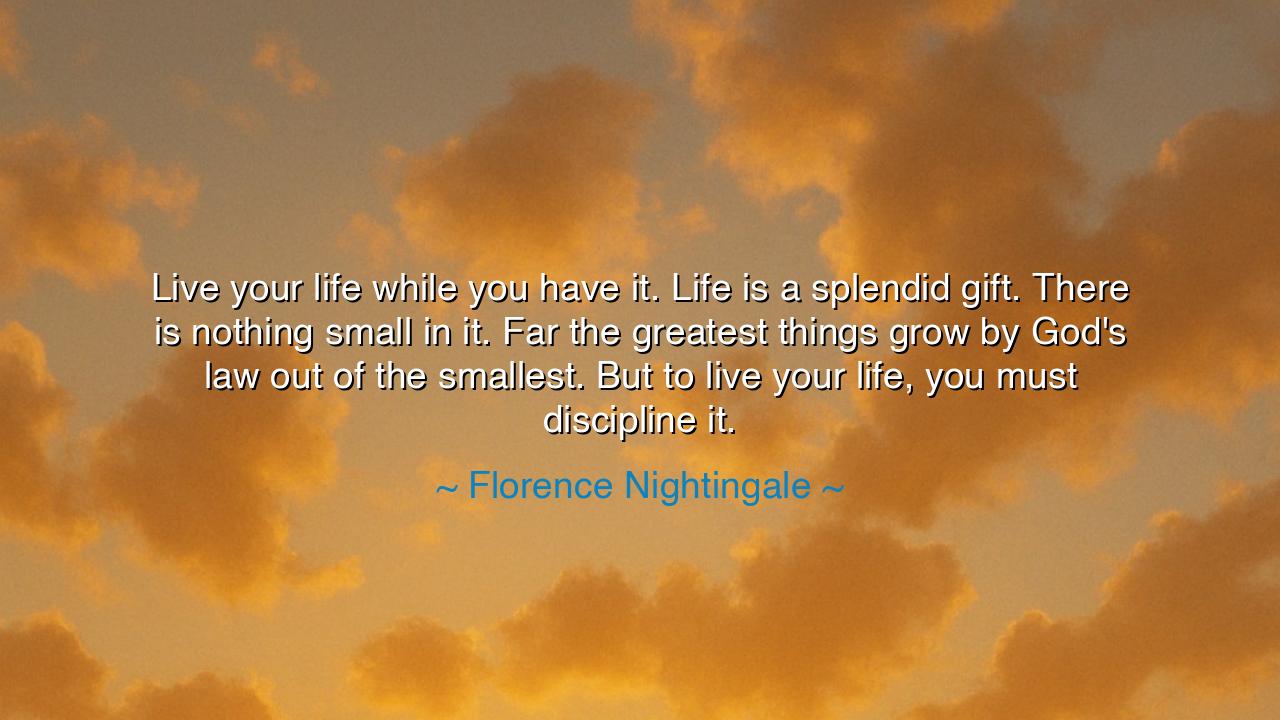
Live your life while you have it. Life is a splendid gift. There
Live your life while you have it. Life is a splendid gift. There is nothing small in it. Far the greatest things grow by God's law out of the smallest. But to live your life, you must discipline it.






Hear now the immortal words of Florence Nightingale, the Lady with the Lamp, who illuminated not only the dark halls of the wounded, but the deeper chambers of the human soul. She said, “Live your life while you have it. Life is a splendid gift. There is nothing small in it. Far the greatest things grow by God’s law out of the smallest. But to live your life, you must discipline it.” These words are not the idle musings of comfort—they are the battle cry of a soul that walked through the valley of death and yet saw the divine majesty in every breath. In her wisdom, she revealed the sacred balance between gratitude and duty, between the beauty of life and the discipline that gives it meaning.
The origin of this quote arises from the heart of Nightingale’s lifelong calling. Born into privilege, she turned her back on ease to embrace the cries of the suffering. During the Crimean War, she tended the wounded soldiers in conditions of horror—disease, filth, and despair. Yet even there, amid the stench of blood and fear, she saw life as sacred, as a splendid gift from the hand of God. Her faith was not naïve; she had seen the cost of existence. But she understood that life’s greatness does not lie in its comfort, but in its purpose. Her words were a reminder to herself and to all humanity: that every heartbeat is holy, every moment an opportunity to serve and to grow, if only we have the courage to discipline our lives to that calling.
When Nightingale said, “There is nothing small in it,” she spoke as one who saw eternity in the smallest act. The touch of a healer’s hand, the kindness of a stranger, the careful cleaning of a wound—these were not trivial deeds, but reflections of divine order. To her, life was woven of infinite significance. God’s law, she believed, transforms the smallest seeds into towering trees, the faintest light into a guiding flame. And so, too, does the disciplined life transform the ordinary into the extraordinary. For it is not greatness that sanctifies a life—it is the faithfulness with which one lives it.
Consider the story of her nightly rounds in the Crimean hospitals. The soldiers, lying in agony, would see her pass through the corridors, a small lamp in her hand, her shadow falling gently across their faces. They called her “the Lady with the Lamp,” and in that quiet light they found hope. What was that lamp, if not the symbol of her own words? A small thing, yet through discipline, devotion, and divine purpose, it became a beacon that outshone fear. Florence Nightingale’s greatness was not born in grand gestures but in small acts performed with unwavering love. Thus she embodied her own teaching: that the greatest things grow by God’s law out of the smallest.
But her wisdom also carries a stern reminder. She said, “To live your life, you must discipline it.” For life, though splendid, is not aimless. It is a gift, yes—but a gift entrusted, not indulged. Without discipline, the gift of life withers into waste. Nightingale understood that passion without purpose is chaos, and talent without structure is squandered. She rose before dawn, worked through the night, studied tirelessly, and reformed entire systems of medicine and hygiene—all because she governed her days with the order of a soldier and the devotion of a saint. Her life was not easy, but it was fruitful, for she mastered herself to serve others.
In her teaching lies a truth for all generations: to live fully is not to chase pleasure or ease, but to cultivate meaning. Discipline is the vessel through which joy flows steadily; without it, even the most brilliant gift spills into waste. To live one’s life is to take ownership of one’s time, one’s thoughts, one’s soul—to shape them with intention, so that they might serve a higher good. Every great artist, leader, or healer has known this law: that freedom without self-mastery is illusion, and greatness without humility is corruption.
Therefore, let this wisdom be inscribed upon your heart: life is not measured by its length, but by its depth and direction. Wake each day with gratitude that you still breathe the divine air. Seek the small tasks that serve the great purpose. Discipline your mind to be clear, your heart to be steady, your hands to be willing. The smallest kindness, the quietest prayer, the most patient labor—these are the roots of eternal greatness.
And so, O child of the living God, remember Florence Nightingale’s legacy. Do not waste the splendid gift of life in idleness or fear. Live it with reverence, govern it with discipline, and offer it with love. For in the divine law of growth, every humble seed, when nourished with faith and effort, becomes a tree whose branches touch heaven. And in that sacred blooming, your life—however small it may seem—will shine with the same immortal light as hers.






AAdministratorAdministrator
Welcome, honored guests. Please leave a comment, we will respond soon